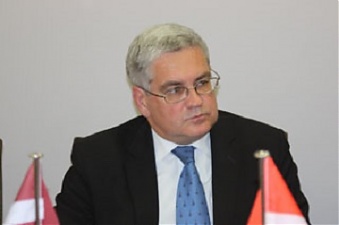Education and Science, Latvia
International Internet Magazine. Baltic States news & analytics
Wednesday, 28.01.2026, 15:57
Ban on teaching in Russian at private universities to affect Latvia's education export capacity - RISEBA vice-rector
 Print version
Print version |
|---|
"If we
refuse enrollment to would-be students who wish to study in Russian, I believe
that Latvia will be losing 2,000 to 3,000 students annually," points out
Graurs. He refers to a study done by the Certus think tank, which finds that
each foreign student contributes approximately EUR 27,000 to Latvia's budget.
"Let me do the math for you: 2,000 students means minus 54 mln [euros] for
the Latvian economy," Graurs explains.
Likewise,
Latvia's restrictions on studies in English can also scare foreign students off
as there are no such restrictions in the neighbor countries. "We are in
fact handing the students who currently study in Latvia over to them [the
neighbor countries], and that is rather dangerous," says Graurs.
According
to Graurs, some 5,300 students in Latvia study in Russian, which is approximately
6% of all students. These include local as well as foreign students, many of
which have come to study in Latvia because they can choose Russian as the
instruction language.
Graurs said
that he and other like-minded activists would continue trying to have the
amendments altered. If these attempts fail, the number of students in Latvia
will decrease dramatically, which will affect universities and colleges, as
well as availability of qualified lecturers.
As
reported, earlier this month President Raimonds
Vejonis promulgated the bill banning use of Russian as the language of
instruction also at private universities in Latvia. Saeima passed the
legislation on June 21.
Saeima
group of Harmony, as well as the heads of several universities and NGOs
previously asked Vejonis not to promulgate the amendments.
The
Education and Science Ministry proposed applying to private universities and
colleges the same restrictions that apply to public higher education
institutions, where students have to be taught in Latvian or any of the
official languages of the European Union, which means that private colleges and
universities will have to discontinue teaching their students in Russian.
The
ministry said the changes were needed also in relation to the legislative
amendments about the switch to Latvian-only secondary education at schools.
The
amendments will take effect on January 1, 2019, and after that the education
establishments will not be allowed to enroll students in new Russian-language
study programs and will have to complete the ongoing study programs in Russian
by December 31, 2022.
According
to the Education and Science Ministry's report on higher education in 2017,
approximately one-third of students at private universities and colleges
studied in Russian last year, while the proportion at state-funded universities
and colleges was less than 1%.
The total
number of students studying at Latvian public and private universities in the
Russian language was 5,332 or 7% of all students in 2017.








 «The Baltic Course» Is Sold and Stays in Business!
«The Baltic Course» Is Sold and Stays in Business!

